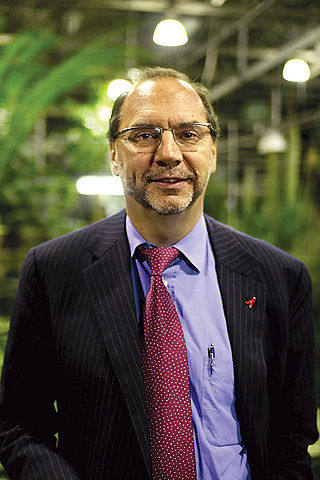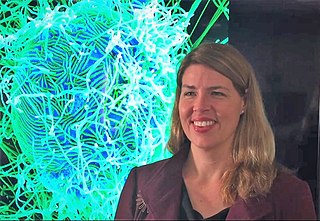Related Research Articles

Sir Peter Karel, Baron Piot, is a Belgian-British microbiologist known for his research into Ebola and AIDS.

Viral hemorrhagic fevers (VHFs) are a diverse group of animal and human illnesses. VHFs may be caused by five distinct families of RNA viruses: the families Filoviridae, Flaviviridae, Rhabdoviridae, and several member families of the Bunyavirales order such as Arenaviridae, and Hantaviridae. All types of VHF are characterized by fever and bleeding disorders and all can progress to high fever, shock and death in many cases. Some of the VHF agents cause relatively mild illnesses, such as the Scandinavian nephropathia epidemica, while others, such as Ebola virus, can cause severe, life-threatening disease.

Crimean–Congo hemorrhagic fever (CCHF) is a viral disease. Symptoms of CCHF may include fever, muscle pains, headache, vomiting, diarrhea, and bleeding into the skin. Onset of symptoms is less than two weeks following exposure. Complications may include liver failure. Survivors generally recover around two weeks after onset.
Globalization, the flow of information, goods, capital, and people across political and geographic boundaries, allows infectious diseases to rapidly spread around the world, while also allowing the alleviation of factors such as hunger and poverty, which are key determinants of global health. The spread of diseases across wide geographic scales has increased through history. Early diseases that spread from Asia to Europe were bubonic plague, influenza of various types, and similar infectious diseases.

La Jolla Institute for Immunology is a non-profit research organization located in La Jolla, San Diego, California. It is located in UC San Diego’s Research Park. The institute researches immunology and immune system diseases. The institute employs 220 M.D.s and Ph.D.s, including 23 faculty members and more than 450 employees. Dr. Mitchell Kronenberg has served as its president and scientific director since 2003. The institute was founded in 1988.
Oyewale Tomori is a Nigerian professor of virology, educational administrator, and former vice chancellor of Redeemer's University.
Leslie Lobel was an American-born Israeli virologist and physician at Ben-Gurion University in Israel, where he was a leading researcher attempting to develop a vaccine and cure for infectious diseases, primarily Ebola. He was Chair of their Department of Virology and Developmental Genetics, and Vice Chair of the Department of Microbiology, Immunology and Genetics.

Remdesivir, sold under the brand name Veklury, is a broad-spectrum antiviral medication developed by the biopharmaceutical company Gilead Sciences. It is administered via injection into a vein. During the COVID‑19 pandemic, remdesivir was approved or authorized for emergency use to treat COVID‑19 in numerous countries.

Jean-Paul Joseph Gonzalez is a French virologist. He graduated from the Medical School of Bordeaux University France.

Erica Ollmann Saphire is an American structural biologist and immunologist and a professor at the La Jolla Institute for Immunology. Her research investigates the structural biology of viruses that cause hemorrhagic fever such as Ebola, Sudan, Marburg, Bundibugyo, and Lassa. She was awarded the Presidential Early Career Award for Scientists and Engineers in 2008.
Jennifer Nuzzo is an American epidemiologist. She is Director of the Pandemic Center and Professor of Epidemiology at the Brown University School of Public Health, having previously taught at the Johns Hopkins Bloomberg School of Public Health. She is also a Senior Fellow for Global Health at the Council on Foreign Relations.

Neil Morris Ferguson is a British epidemiologist and professor of mathematical biology, who specialises in the patterns of spread of infectious disease in humans and animals. He is the director of the Jameel Institute, and of the MRC Centre for Global Infectious Disease Analysis, and head of the Department of Infectious Disease Epidemiology in the School of Public Health and Vice-Dean for Academic Development in the Faculty of Medicine, all at Imperial College London.

Michael Joseph Ryan is an Irish epidemiologist and former trauma surgeon, specialising in infectious disease and public health. He is executive director of the World Health Organization's Health Emergencies Programme, leading the team responsible for the international containment and treatment of COVID-19. Ryan has held leadership positions and has worked on various outbreak response teams in the field to eradicate the spread of diseases including bacillary dysentery, cholera, Crimean–Congo hemorrhagic fever, Ebola, Marburg virus disease, measles, meningitis, relapsing fever, Rift Valley fever, SARS, and Shigellosis.
Maria DeJoseph Van Kerkhove is an American infectious disease epidemiologist. With a background in high-threat pathogens, Van Kerkhove specializes in emerging and re-emerging infectious diseases and is based in the Health Emergencies Program at the World Health Organization (WHO). She is the technical lead of COVID-19 response and the head of emerging diseases and zoonosis unit at WHO.

Angela Lynn Rasmussen is an American virologist at the Vaccine and Infectious Disease Organization at the University of Saskatchewan in Canada.

Scott Halstead is an American physician-scientist, virologist and epidemiologist known for his work in the fields of tropical medicine and vaccine development. He is considered one of the world's foremost authorities on viruses transmitted by mosquitoes, including Dengue, Japanese encephalitis, chikungunya and Zika. He was one of the first researchers to identify the phenomenon known as antibody-dependent enhancement (ADE), where the antibodies generated from a first dengue infection can sometimes worsen the symptoms from a second infection.
John J. Lowe is an American infectious disease scientist, assistant vice chancellor for health security at University of Nebraska Medical Center, and associate professor in the Department of Environmental, Agricultural and Occupational Health at University of Nebraska Medical Center College of Public Health. In 2014, he led Nebraska Medicine hospital’s effort to treat and care for Ebola virus disease patients and led the University of Nebraska Medical Center’s coronavirus disease 2019 response efforts.

John R. Mascola is an American physician-scientist, immunologist and infectious disease specialist. He was the director of the Vaccine Research Center (VRC), part of the National Institute of Allergy and Infectious Diseases (NIAID), National Institutes of Health (NIH). He also served as a principal advisor to Anthony Fauci, director of NIAID, on vaccines and biomedical research affairs. Mascola is the current Chief Scientific Officer for ModeX Therapeutics.
Metabiota is a San Francisco startup that compiles data from around the world to predict disease outbreaks. The company is a partner with USAID's PREDICT and PREVENT programs. In the early months of the SARS-CoV-2 outbreak, Metabiota and BlueDot independently demonstrated the capabilities of computer analytics to map the future spread of the virus between countries.
Corona-chan is a moe anthropomorphization of the coronavirus which became a popular meme on 4chan, Reddit and other websites during the ongoing COVID-19 pandemic.
References
- 1 2 3 "Joseph Fair". American Society for Microbiology. Archived from the original on 19 May 2020. Retrieved 14 May 2020.
- 1 2 "A Virologist Takes You Inside the Ebola Protective Suit". NPR. Archived from the original on 9 May 2020. Retrieved 16 April 2020.
- ↑ "Joseph Fair". IMDb. Archived from the original on 2017-02-15. Retrieved 2020-07-03.
- ↑ "Alumnus is working front lines of Ebola outbreak in West Africa - Loyola University New Orleans". www.loyno.edu. Archived from the original on 2015-09-07. Retrieved 2020-07-03.
- 1 2 "Senior fellows: Joseph Fair". Bush School of Government and Public Service. Archived from the original on 14 November 2018.
- ↑ "Ebola in DRC: Q&A with Dr. Joseph Fair". Outbreak Observatory. Archived from the original on 2022-04-01. Retrieved 2020-07-04.
- ↑ Wamsley, Laurel (May 22, 2020). "Coronavirus FAQs: Can I Catch It Through My Eyes? Will Goggles Help?". NPR . Retrieved April 23, 2023.
- ↑ Fieldstadt, Elisha (May 14, 2020). "Virologist hospitalized with coronavirus believes he got it through his eyes". NBC News. Archived from the original on 2022-04-01. Retrieved 2020-07-04.
- ↑ Murray, Rheana. "After severe illness, NBC's Dr. Joseph Fair tests negative for COVID-19 antibodies". TODAY.com. Archived from the original on 2020-07-09. Retrieved 2020-07-11.
- ↑ Dawood, A.A. (January 2021). "Transmission of SARS CoV-2 virus through the ocular mucosa worth taking precautions". Vacunas (English Edition). 22 (1): 56–57. doi: 10.1016/j.vacune.2021.01.007 .